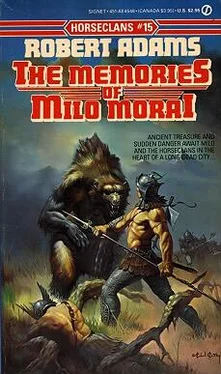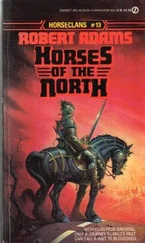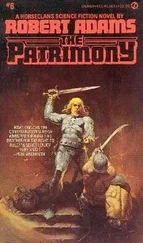MacLeish looked at Birnbaum and Birnbaum looked at MacLeish, then both began to leaf through the stacks of manila folders. At length, MacLeish held a whispered consultation with Birnbaum, then closed the last folder and answered.
“In the neighborhood of twenty-one million dollars, Mr. Moray. But please understand, the figure only represents domestic holdings, and very little of the figure is fluid. Most of it is in land, buildings and equipment, cattle, sheep, horses and such, crops not yet harvested, fishing boats, machinery, that sort of thing.”
“Of course,” Birnbaum added, “if you and Mrs. Sti—ahhh, Mrs. Moray should be in need of cash just now, it might be wise to speak with the late general’s personal attorney to whom he entrusted, I am given to understand, the keys to certain safety-deposit boxes as well as the numbers to certain Swiss accounts.”
Milo got the same treatment when he mentioned his name to the receptionist of the law firm and assumed that the accountants must have telephoned ahead of him. Although it was a slightly luxurious office rather than a conference room into which a secretary ushered him and although only a single man awaited him, there still was hot coffee, hot tea and a larger selection of booze than the previous offerings.
“So you’re Milo Moray, hey?” said John Bannister, while shaking hands. “Poor Jethro often spoke and wrote about you. God bless you, you were and are the best friend he ever had. Just how and where did he die? Do you know?”
“He died in my arms, Mr. Bannister, shot in the back by a Hitler Youth sniper all of about fourteen years old, on the street of a little town in Germany, at the very tail end of the war, more’s the pity,” said Milo solemnly. “And only a few minutes before, I had been pooh-poohing his presentiments that he soon would be dead.
“And, by the way, he entrusted to me a large sealed envelope to be delivered to his attorneys on his death, but no name was given and the accountants mentioned that you are not the only law firm he retained.”
“No, they were wrong, Mr. Moray. I was Jethro’s only attorney. The other firm represented his late father and the estate, which did not come into Jethro’s sole ownership until his younger sister died in 1934. After he and I weighed and discussed the matter, it was our mutual decision to allow them to continue to manage the bulk of the estate matter, for, after all, they knew it in depth and had more than adequate personnel. At that time, my own staff was not so large, you see.
“But back to Jethro’s presentiment, yes, I saw that several times in my squadron, during the war. I was a Marine Corps fighter pilot. I believe you were an infantry officer. First lieutenant? Or am I wrong?”
Milo nodded. “I was discharged in the rank of major, Mr. Bannister, but, yes, I was an infantry officer . . . and an infantry sergeant, before that, a Regular, like Jethro.”
Bannister’s pale, thin lips twisted into a wry, lop-sided smile. “Did Jethro ever tell you exactly why he chose to virtually entomb himself in the enlisted ranks of a peacetime army, Mr. Moray?”
“No.” Milo shook his head. “Other than to say that that life was his penance for some heinous crime committed long ago, in his youth. He was very close-mouthed when he wanted to be, which was most of the time, about his inherited affairs, that is . Hell, I never even knew that he was married until well after the war had started, when he took me down to Virginia and introduced me to Martine and his kids.”
With a single, slow nod, the attorney said, “Very much against the expressed wishes of his father, his mother and his uncle, Jethro Stiles left Dartmouth and sailed to France in 1915 as a driver with an American ambulance company, but once there, he wrangled his way into a French infantry regiment. Martine’s father was initially his platoon leader and, later, his company commander; her grandfather was the commanding officer of his division. He was, I am told, quite a good combat soldier for the French, garnering a number of awards for valor. Unlike many Americans who started out fighting for the French or the British in that war, he did not transfer over to the U.S. Army when America entered the war, but remained with his regiment until the Armistice.
“At the age of twenty-one, in 1919, Jethro came back to the United States, his interrupted college courses and his fraternity life. In some ways, the war and his experiences in it as a French infantryman had matured him, but in others he still was no more than he had been when he had left, four years before—a callow undergraduate scion of a wealthy family, born to privilege, and arrogantly irresponsible.
“With his automobile and his expensive, fashionable clothing, with his worldly-wise and free-spending manner, he dazzled and seduced a working-class townie girl.
“He had mastered certain hand-to-hand combat techniques during the war, of course, and also had learned savate. When the girl’s two elder brothers ambushed him and made to do him bodily injury, he all but killed them. No charges were brought by the authorities, for both of the young men were possessed of long police records for boozing, brawling, petty theft and similar offenses, but the girl’s family ordered her to stay away from Jethro.
“She did not, of course, and their affair was carried on until he finally got her pregnant. There was never any consideration of marriage, of course, for she was just too far beneath him, so he persuaded her, made arrangements and drove her clear down to Boston to undergo an abortion. But something went wrong. She hemorrhaged on the way back to Hanover, and she died in a hospital in Manchester.
“In the wake of the autopsy, the authorities at all levels went for Jethro’s scalp with a vengeance. Her brothers came after him a second time, and that time he had to kill one of them and he paralyzed the other, although he was shot twice during the fracas.
“With Jethro hospitalized under police guard, his father and his elder brother, Jeremiah, came up to New Hampshire and began to pull in political markers and grease palms right and left. They ended in plunking down a bail bond, in cash, that was a staggering sum for that time and place, took him down to New York until he was more or less recovered of his wounds, then put him aboard a ship bound for Europe. After more monies had changed hands, all of the charges against Jethro were quietly quashed, but he chose to stay in Europe until 1928. When he did come back, he met only once with his father, his uncle and his brother, then he journeyed a thousand or more miles across the country and enlisted in the United States Army.”
Milo shook his head. “Jesus, to have heard Jethro tell the little he ever did tell, you’d’ve thought he’d done some really terrible things. It wasn’t—couldn’t have been—his fault if some back-alley abortionist fucked up. And as for the other, if a couple of hoods had attacked me with guns, I’d’ve likely done my utter damnedest to kill or paralyze them, too. Mr. Bannister, I knew Jethro as only a military buddy can know another, and I’m here to tell you that he was a good man, a damned good man—decent, caring for those who depended upon him . . .”
“I know, I know, you don’t need to tell me.” Bannister held up a palm. “Mr. Moray, Jethro was not only my client, he was my friend, as well. All that you say about him was true, of course, you know it and I know it, but he did not, could not. He brooded on those three deaths—the paralyzed man died a couple of years later—and he could not seem to ever shake the feeling that he bore an ongoing guilt for all of it. He was obsessed, I think.
“But poor Jethro has joined the majority, now. What about the envelope of which you spoke earlier?”
Читать дальше












